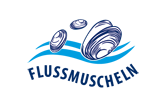Proposal
Initial situation
The freshwater pearl mussel is still at risk of becoming extinct in Germany. For now, an initial stabilisation has only been seen in a few stocks, a clear turnaround has not yet been achieved. The slow reaction of stocks to protective measures is due to the complex interplay of different risk factors and the long development period of the freshwater pearl mussel.
Some of the main risk factors for freshwater pearl mussels include:
- High sediment input in the water which leads to an increased suspended sediment load and filling of the gravel interstitial system
- Poor substrate quality of the riverbed due to an increase in the amount of fine particles and the removal of large stones and rocks
- Pollutant inputs in the water
- Poor quality and availability of food
- Lack of host fish
- Low target species populations which can result in inbreeding and ageing populations
- River development, e.g. bank reinforcement, waterway straightening and other similar structural measures
- Climate change (higher water temperatures, resulting in lower oxygen levels in the water, stretches of water drying up, flood events causing the mussels to drift)
- Lack of structure in the rivers, usually due to the removal of “interfering” elements such as large stones or dead wood during the development of the river
Work on remedying certain defects was already started in a range of different precursor projects, however further efforts are required.
Risk factors
Selection of MARA precursor projects
The project partners were already involved in mussel conservation before MARA and projects have already been carried out in the different project areas that have laid the foundations for the MARA Project. The following overview contains a selection of the different initiatives and projects:
- Different local initiatives for the conservation of the FPM in the districts of Passau, Freyung-Grafenau, Regen and Cham
Funding: Bavarian Nature Network (BayernNetz Natur) projects; Landscape Conservation and Natural Reserve Guidelines (Landschaftspflege- und Naturpark-Richtlinie)
Time period: 1992-2014
Project area: South-East Bavaria
Responsible for implementing the project: District and city of Passau, Passau Landscape Conservation Association (Landschaftspflegeverband Passau), district of Freyung-Grafenau, district of Regen, Upper Bavarian Forest Nature Park. In MARA, they form the Association for Saving the Freshwater Pearl Mussel in South-East Bavaria (Trägergemeinschaft zur Rettung der Flussperlmuschel in Südostbayern) which is represented by the district of Passau.
Content: Establishment of a freshwater pearl mussel breeding programme, measures for sediment retention, conversion of land use - ArKoNaVera - Implementation of regional protective measures and development of a new national species conservation plan for the national responsibility species: the freshwater pearl mussel (Margaritifera margaritifera) and the Painter’s mussel (Unio pictorum)
Funding: Research and implementation project within the framework of the National Biological Diversity Programme, joint funding from the General Federal Ministry for the Environment, Nature Conservation, Nuclear Safety and Consumer Protection / German Federal Agency for Nature Conservation and the German Federal Ministry of Education and Research, as well as a range of different third-party sponsors
Time period: 2015-2021
Project area: South-East Bavaria, Saxon Vogtland
Responsible for implementing the project: Technische Universität Dresden, Technical University of Munich, Fraunhofer Center for International Management and Knowledge Economy, district of Vogtland, district of Passau, WAGU GmbH, Saxony State Foundation for Nature and the Environment
Content: Freshwater pearl mussel breeding, sediment retention, structural improvements in the target bodies of water. - Development of sustainable young mussel stocks in NATURA 2000 areas in the Bavaria-Czech Republic Green Belt
Funding: EU-Interreg IIIA
Time period: 2014-2020
Project area: North-East Bavaria
Responsible for implementing the project: Hof District Group of the Bavarian Nature Conservation Association (Bund Naturschutz Kreisgruppe Hof), Nature Conservation Agency of the Czech Republic
Content: Construction of a breeding station, sediment retention - EU-LIFE – Living streams in the Eifel (Lebendige Bäche in der Eifel)
Funding: LIFE Natur
Time period: 2003-2009
Project area: North Rhine-Westphalia
Responsible for implementing the project: Biological Station for the Aachen CitiesRegion e.V. (Biologische Station StädteRegion Aachen e.V.), Euskirchen Biological Station
Content: Restoration of bodies of water - Conservation and preservation of the FPM in North Rhine-Westphalia
Funding: NRW Foundation (NRW Stiftung), amongst others
Time period: 2003-2020
Project area: North Rhine-Westphalia
Responsible for implementing the project: Biological Station for the Aachen CitiesRegion e.V.
Content: Freshwater pearl mussel breeding
By including all the people and associations involved in the implementation of precursor projects, the MARA Project continues to build on these projects and further develop the methods and measures established. First, the initiatives that have, until now, been limited to individual areas will be brought together and systematically networked. The concentrated collaboration offers a range of advantages for breeding programmes, for example, and increases visibility through the synergies of joint public work. This should ensure that the long-term goals of establishing self-sustaining freshwater pearl mussel stocks and increasing public awareness for biological diversity in general, and for the freshwater pearl mussel in particular, are achieved.
On an international level, there have mostly been individual initiatives in different countries that have only exchanged information sporadically. Funding projects in recent years have frequently set up breeding stations, e.g. in France, Luxembourg, Spain, England or Norway. As such, MARA also aspires to build a much stronger network on an international level by establishing an international freshwater pearl mussel network. This will allow the individual initiatives to work together closely and benefit from each other’s experiences. An example for this international network of experts is the Native Oyster Restoration Alliance which concerns itself with protecting another species of large mussel, the European oyster.





